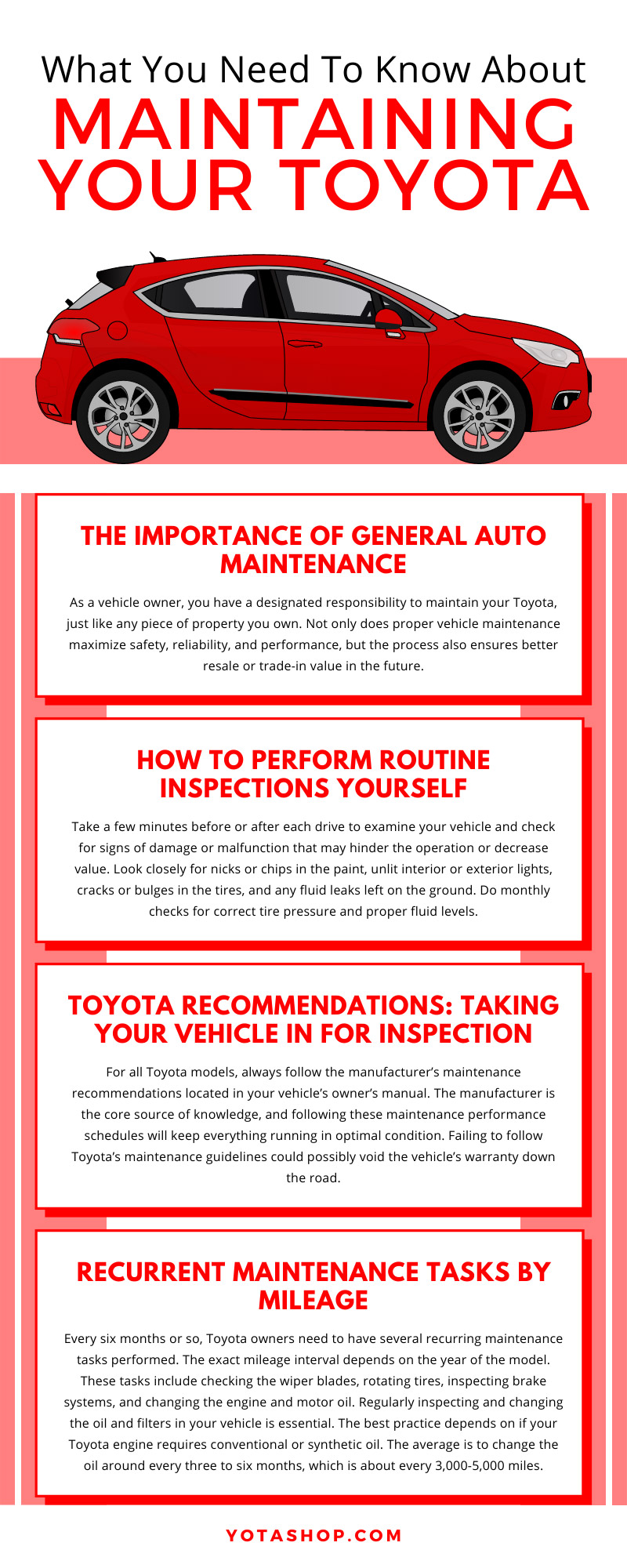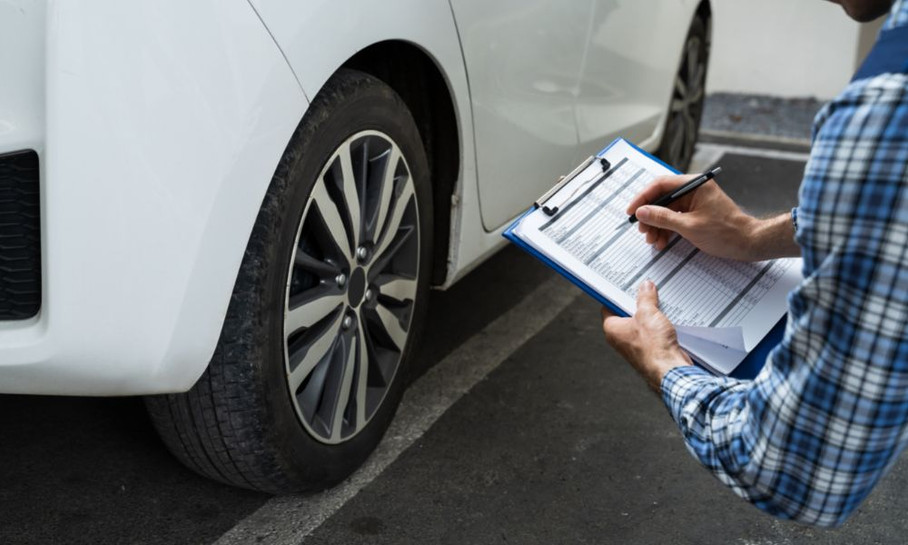Let’s face it: investing in a car, SUV, or truck is not a simple or cheap feat. After enduring the lengthy research and purchasing process, you want to preserve your precious time and money for years to come. Such a large purchase is a substantial investment worth persevering for the long run.
How so? The best protection method for any vehicle on the road is maintenance. A well-maintained automobile can easily keep moving forward for hundreds of thousands of miles; especially when that vehicle is a reputable and reliable Toyota.
Since its initial founding, Toyota is a motor company that strives to design and build automobiles that contribute positively to society. But even the best-built vehicles with exceptional comfort, performance, and dependability can turn into dangerous or unreliable modes of transportation without proper maintenance. As Toyota experts, we’ve compiled a guide to help you with this critical part of vehicle ownership. Here is what you need to know about maintaining your Toyota.
The Importance of General Auto Maintenance
As a vehicle owner, you have a designated responsibility to maintain your Toyota, just like any piece of property you own. Not only does proper vehicle maintenance maximize safety, reliability, and performance, but the process also ensures better resale or trade-in value in the future.
A wide range of your vehicle’s features requires some special care and attention from time to time. These parts are likely to last longer when kept in good shape. Failing to provide this preventative or routine care may lead to costly mishaps that shorten the lifespan of the vehicle—or leave a noticeable dent in your wallet. All things considered, having knowledge of how to maintain your Toyota will save you headaches and hassles.
How To Perform Routine Inspections Yourself
The key to vehicle maintenance is following Toyota’s recommended guidelines for daily, monthly, or yearly inspections. The long-lasting performance benefits of a Toyota mean nothing without regular inspecting and servicing.
Take a few minutes before or after each drive to examine your vehicle and check for signs of damage or malfunction that may hinder the operation or decrease value. Look closely for nicks or chips in the paint, unlit interior or exterior lights, cracks or bulges in the tires, and any fluid leaks left on the ground. Do monthly checks for correct tire pressure and proper fluid levels. Examine power steering, engine oil, brake fluid, and transmission fluid. You can find the right tire pressure level for your model on a sticker inside the driver’s door.
Toyota Recommendations: Taking Your Vehicle In for Inspection
For all Toyota models, always follow the manufacturer’s maintenance recommendations located in your vehicle’s owner’s manual. The manufacturer is the core source of knowledge, and following these maintenance performance schedules will keep everything running in optimal condition. Failing to follow Toyota’s maintenance guidelines could possibly void the vehicle’s warranty down the road.
Refer to this recommended schedule for regular checkups and do not exceed these service intervals. At a minimum, aim to bring your Toyota in for inspection by a qualified mechanic once a year or so.
Recurrent Maintenance Tasks By Mileage
Every six months or so, Toyota owners need to have several recurring maintenance tasks performed. The exact mileage interval depends on the year of the model. These tasks include checking the wiper blades, rotating tires, inspecting brake systems, and changing the engine and motor oil.
Regularly inspecting and changing the oil and filters in your vehicle is essential. The best practice depends on if your Toyota engine requires conventional or synthetic oil. The average is to change the oil around every three to six months, which is about every 3,000-5,000 miles.
This check-up system depends on whichever comes first. If you do not drive enough mileage in that timeframe, you would change the oil around the six-month mark. On the contrary, if you drive over this mileage range before six months have passed, you will change the oil when the odometer hits 5,000 miles.
Be Vigilant: Common Signs Your Toyota Needs Maintenance
When maintaining your Toyota, the general signs of automotive trouble are what you need to know to vigilantly protect your investment. Here are a few worth mentioning.
Dashboard Warning Lights
Cars are considerably intelligent with their built-in computers, monitors, and sensors. For this reason, warning lights lit up on your Toyota’s dash are obvious physical signs you need service immediately or as soon as possible. Be vigilant and do not ignore any warnings or indications that something is amiss in your vehicle. Problems with vehicle systems or components can be dangerous and costly. Always address illuminated low oil, low tire pressure, and check engine lights for optimal safety on the road.
Soft or Noisy Brakes
Modern brakes should be quiet and responsive. If you notice any noise issues, resistance, or oversensitivity, there’s more than likely a problem at hand. Like most auto parts, brake pads and fluid do not last forever in a vehicle. Do not wait to replace these critical components—nobody wants their brakes to overheat and fail when driving.
Bad Vibrations
Feeling shaking or vibrating in the steering wheel or throughout the entire vehicle is a clear indicator of an ongoing situation. A vehicle that suddenly shudders or vibrates—on smooth road surfaces—has a noticeable issue. This simple or serious problem could involve tires, joints, bearings, or loose paneling. Get this red flag checked out right away.
Poor Fuel Mileage
An identifiable decrease in fuel mileage is a clear indicator your Toyota is not functioning as efficiently as possible. Track your baseline knowledge if you’re filling up the gas tank more frequently than usual. A service tune-up will help if there's a problem with a system or part. Nobody wants to be paying for fewer miles to the gallon in the current economy.
Quality Automotive Parts: The Key to Toyota Reliability
Nothing is more significant to maintaining the reliability of a Toyota than high-quality car parts. Investing in quality is key when purchasing operational parts for repair or replacement. In the context of auto parts, one term every Toyota owner should know is OEM. OEM refers to Original Equipment Manufacturer, and these parts derive from the same manufacturer that made the car—Toyota.
The YotaShop Difference
If you need exceptional OEM parts for repairs, upgrades, or replacement, our team has you covered. NW Team Yota carries a selection of top-quality AISIN auto parts in our online catalog. We only offer the best-in-class options on the market for our fellow Toyota enthusiasts. Browse Yotashop.com to see the difference for yourself today!


